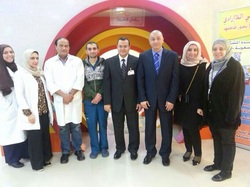
The Disable Child Care Clinic at the Pediatrics & Neonatal Department at Kuwait's Adan Hospital provides a one-stop shop for disabled children who live in the Al Ahmadi and Mubarak Al Kabeer governorates. Through a collaborative program with doctors from a range of specialties, the DCC provides a weekly service where disabled children and their parents can meet with a team of doctors (rather than having to schlep to various offices around Kuwait) and receive a more unified treatment program. Kuwait Moms Guide spoke with Dr Niran Al-Naqqeb, Neonatal Consultant, Head of Pediatrics & Neonatal Department at Adan Hospital to learn more about the DCC and the dedicated doctors and nurses who make it happen
KMG: What is the DCC clinic and what ages of children does it serve?
Dr Al Naqqeb: DCC Clinics are Disabled Child Care Clinics. It's for children with physical disabilities who are less than 12 years of age.
KMG: Can children of other governorates come to this clinic or only those that live in Mubarak al Kabeer and Ahmadi?
Dr Al Naqqeb: The clinic currently serves Mubarak Al Kabeer and Al Ahmadi areas only as those consist of the largest percentage of the population in kuwait. However, we may expand and serve other areas in Kuwait in the future.
KMG: How does it work? Can parents bring their children without referrals and without appointments or do they need to follow a specific process?
Dr Al Naqqeb: All children who belong to our governance area and suffer from physical disabilities, especially those with multiple problems and need to be seen by a multidisciplinary team can be seen in the DCC clinic. The child is seen by a general pediatrician first for a full examination upon which a report is written and the child is then booked an appointment at the DCC clinic.
KMG: What specialties does the DCC offer and why is this a good thing for parents and disabled children?
Dr Al Naqqeb: We have specialists dedicated to the DCC clinic as well those who only visit upon request. Those who are regularly available include:
1. General pediatrician
2. Nutritionist and Dietitian
3. Dentist
4. Physiotherapist
5. Social Worker
Those who visit upon request and can be available at the Tuesday DCC clinic:
1. ENT specialist
2. Ophthalmologist
3. Orthopaedic surgeon
4. Neurologist
5. EEG if needed to be done on the same day.
KMG: What are the DCC timings/days?
Dr Al Naqqeb: The DCC is open Tuesdays 8am to 1pm.
KMG: What is the aim or goal of the DCC? Why did you start this?
Dr Al Naqqeb: The aim of this clinic is to have a multidisciplinary team examine the patient at the same day. The team has a group meeting with the parents to discuss their child's case in full and by doing so we minimize the hassle of making parents come for multiple referrals and appointments on different days.
KMG: How many children are regular patients and what are some marks of the program's success?
Dr Al Naqqeb: We started this clinic on 29th of October 2013. We have seen around 85 children. Some of them have been seen for follow ups more than once.
KMG: What advice would you offer parents of a disabled child in Kuwait?
Dr Al Naqqeb: To prepare their questions for the doctors ahead of time so they make full use of their meeting with the team of specialists.
KMG: Is the DCC open to expatriates too and are English speaking doctors available?
Dr Al Naqqeb: Yes, it's for both Kuwaitis and expatriates and there are English-speaking doctors and nurses.
KMG: What disabilities are covered within the scope of the DCC?
Dr Al Naqqeb: Mainly physical disabilities but this covers wide range of conditions like perinatal asphyxia, ex preterm babies with sequelae, some syndromes.
The neonatal department at Adan Hospital also provides a breast feeding clinic, a four days a week morning and afternoon neonatal follow-up clinic, consultant-led neonatal antenatal counseling for prospective parents of babies with medical problems diagnosed antenatally and other support for newborn infants and their parents.
For more information, visit their website or Telephone: 2394-0600.
Editor's Note: This article was originally published in Issue #10 of the Kuwait Moms Guide Newsletter.

 RSS Feed
RSS Feed
